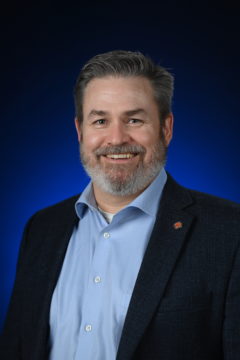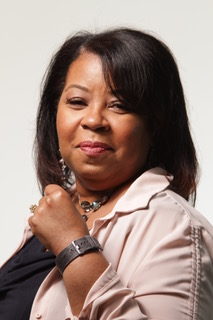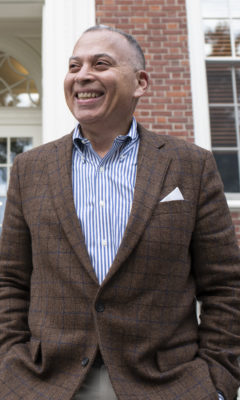SouthTalks series begins Jan. 25 with Michael Fagans
The programming focus at the Center for the Study of Southern Culture for the 2022-23 academic year is “Race in the Classroom,” and the spring SouthTalks lectures follow that theme.
Historically, classrooms have functioned as both intensely local spaces and as broader political stages on which debates about equality, identity and access have played out – nowhere to greater effect than at the University of Mississippi, which last fall marked the 60th anniversary of the campus’ integration.
“Classrooms are not only physical sites where Americans have clashed over who will learn, they are also settings that frame what students will learn and how they will conceptualize themselves as residents of a region and a nation,” said Katie McKee, the center’s director. “This year’s SouthTalks series will consider how ideas about ‘race’ and understandings of ‘the South’ intersect in the classroom.
“Our exploration will range from the colonial hemisphere to the postbellum United States to the Jim Crow era to the civil rights movement to present-day classroom controversies. While our interests include the experiences of Black and white Southerners, they also extend beyond a biracial understanding of the region to one that accounts for the multiplicity of a historical – and a modern – South.”
SouthTalks is a series of events, including lectures, performances, film screenings and panel discussions, that explores the interdisciplinary nature of Southern studies. This series is free and open to the public, and typically takes place in the Barnard Observatory’s Tupelo Room, unless otherwise noted.
This semester also includes some interesting virtual offerings, since virtual events allow connections to larger audiences unable to attend in person and allow speakers to participate no matter their locations.
Visit https://Southernstudies.olemiss.edu/ for information about all center events, including Zoom links for virtual events.

The spring SouthTalks series kicks off at noon Wednesday (Jan. 25) in the Tupelo Room with “Seeing the Unseen,” presented by Michael Fagans, an assistant professor at the School of Journalism and New Media. Fagans is also a photojournalist, author and documentary filmmaker.
This presentation is an expansion of his TEDxUniversityofMississippi talk about how the way people see images lets them see the world in a broader way.
Barbara Harris Combs presents “Blackout: The Continuing Assault against Black Bodies,” a virtual SouthTalk at noon Feb. 1. In this talk, Combs shares insights from her new book, “Bodies out of Place: Theorizing Anti-Blackness in U.S. Society,” which examines practices of racial entrenchment as they have manifested in post-Obama expressions of anti-Blackness in discursive, legal, interactional and extralegal contexts.

Combs previously taught at UM and is professor of sociology and chair of the Department of Sociology and Criminal Justice at Kennesaw State University. Register here for the Zoom session.
Frederick Gooding Jr. presents “I Don’t Wanna Say the Wrong Thing! How to Reconcile with Race in the Classroom” at noon Feb. 8 in the Tupelo Room. This session will persuade attendees to reflect upon their campus practices and consider additional ways in which they can provide welcoming and culturally relevant institutionalized experiences for both their current and future students.
Gooding is an associate history professor and the Dr. Ronald E. Moore Endowed Professor of the Humanities at Texas Christian University.
A SouthTalks film screening of “Promised Land: A Story about Mound Bayou” is set for 5:30 p.m. Feb. 9 in the auditorium of the Overby Center for Southern Journalism and Politics.
The film details how two formerly enslaved cousins bought 840 acres of swampland in the Mississippi Delta in 1887. Benjamin T. Green and Isaiah T. Montgomery used the site to found Mound Bayou, which went on to prosper as the largest and most self-sufficient all-Black town in the United States.
“‘Promised Land: A Story about Mound Bayou’ not only tells the history of Mound Bayou; it celebrates the achievements of its residents and contributes to the conversation about its future,” said Claire Winn, director of programs for the Mississippi Heritage Trust, which funded the project alongside the National Park Service and others.
A discussion and Q&A will follow the screening. Castel Sweet, director of UM Center for Community Engagement, will moderate the discussion and W. Ralph Eubanks, writer-in-residence at the Center for the Study of Southern Culture, will provide opening remarks. Sweet and Eubanks are joined by Mound Bayou natives and community leaders Hermon Johnson Jr., Darryl Johnson and Hermon Johnson Sr.
At noon Feb. 15, Koji Motomura and Annette Trefzer present “Great Fiction Needs More Than One Translation: Translating Welty’s ‘Delta Wedding’ into Japanese”
Motomura, who is working on the translation of Eudora Welty’s “Delta Wedding” into Japanese, will take up various issues surrounding his translation and discuss them with Annette Trefzer. Motomura is a professor of English at Komazawa University in Tokyo, and Trefzer is a UM professor of English.
In a virtual SouthTalk at 1 p.m. Feb. 16, Perla M. Guerrero presents “Vietnamese, Cubans and Mexicans in the South: An Intertwined History.” Register here.
Guerrero’s talk will focus on the Asian and Latino communities in Arkansas in the last quarter of the 20th century to explore placemaking. Guerrero is associate professor of American studies and U.S. Latina/o studies at the University of Maryland at College Park. This event is co-sponsored by the UM Center for the Study of Race and Racism.

W. Ralph Eubanks and Amirhea Bishop present “Reconciliation: The University and the History of the Ole Miss 89” at noon Feb. 22. They will discuss their work to collect and preserve oral histories of the “Ole Miss 89” and how their work aims to give the 1970 “Up with People protest” the place it deserves in the history and memory of activism at the university.
A writer and essayist whose work focuses on race, identity and the American South, Eubanks’ most recent book is “A Place Like Mississippi: A Journey through a Real and Imagined Literary Landscape.” Bishop is a first-year master’s student in the center’s Southern studies program. She serves as Eubanks’s research assistant for the Black Power at Ole Miss Task Force committee, which documents the stories and preserves the legacy of the Ole Miss 89 through oral histories.
Allison Grant will host a gallery walk in the Barnard Observatory Gammill Gallery at 5 p.m. Feb. 22 for her exhibition “Within the Bittersweet,” a dark, pastoral narrative about raising children amid concerns about the impacts of climate change and environmental contamination.
All the photographs in the exhibit were taken in and around Grant’s home in Tuscaloosa, Alabama, where dense vegetation and natural beauty intersect with industrial and fossil-fuel facilities that dot the region. Grant is an artist, writer, curator and assistant professor of photography at the University of Alabama.
Two events are planned for March 1. At noon, join documentary editor Sarah Garrahan as she talks about strategies for editing documentary feature films, including working with a team, how not to get overwhelmed and practical skills that help get films to the finish line.
Garrahan is a documentary producer and editor from San Antonio who lives in Los Angeles. She co-produced and was an additional editor on the hybrid documentary “The Infiltrators” by Cristina Ibarra and Alex Rivera, which premiered at the 2019 Sundance Film Festival and was awarded the NEXT Audience and Innovator Awards.
Then at 5:30 p.m., Zoë Burkholder presents “An African American Dilemma: A History of School Integration and Civil Rights in the North.” In her book of the same title, Burkholder offers the first and most comprehensive analysis of the history of Black struggles for educational equality in the North.
She is a historian of education, professor of educational foundations and founding director of the Holocaust, Genocide and Human Rights Education Project at Montclair State University. This event also will be available for virtual attendance. Register for the webinar here.
Jared Ragland will discuss “What Has Been Will Be Again: Place, Time and the Politics of Remembrance” at noon March 8. In a moment of pandemic, protest and polarization, the photographer has journeyed across more than 25,000 miles and into each of Alabama’s 67 counties to survey his home state’s cultural and physical landscape.
In this presentation, Ragland will discuss the project’s strategic focus on the importance of place, the passage of time and the political dimension of remembrance as means of confronting white supremacist myths of American exceptionalism. Ragland is a fine art and documentary photographer and former White House photo editor.
The UM Department of Art and Art History and the Do Good Fund helped make this exhibit and presentation possible. Ragland’s exhibit, “What Has Been Will Be Again,” runs Feb. 27-March 31 in the Gammill Gallery. The center also includes his work in a photo essay of the same name in Study the South, its online journal.
Tison Pugh presents “Truman Capote, Ellen DeGeneres and Miley Cyrus: Southern Stars and the South’s Queer Myths” at noon March 22 in the Ole Miss Student Union, Room 124. This presentation examines three vastly different queer Southern stars – Capote, DeGeneres and Cyrus – to consider ways in which the South’s mythologies influence presentation of their selves, their star personas and their sexualities.
Pugh, the Pegasus Professor of English at the University of Central Florida, is author or editor of more than 20 volumes. This event is in partnership with the Sarah Isom Center for Women and Gender Studies and the Center for Inclusion and Cross-Cultural Engagement.
At noon April 5, Andrew Donnelly will lecture about “Civil War Memory and the History of Homosexuality.” Two developments took place at the end of the 19th century: one, a national shift of sympathies retrospectively toward the lost Confederate cause and, two, the emergence of homosexuality as an identity in medicine and the law.
This talk brings these two seemingly disconnected phenomena together to narrate how the emergence of homosexuality operated alongside Lost Cause ideology to foster nostalgia for a pre-homosexual and pre-Civil War past. Donnelly is a visiting assistant professor of English and Southern Studies at UM.
Ryan Parsons presents “Race and the College Mobility Trap” at noon April 26. For many students, especially young people of color from disadvantaged communities, the pathway to education is marked by detours, potholes and other obstacles to “conventional” success.
Parsons revisits the idea of “the mobility trap” – situations in which people must choose between mobility options that make sense locally and those that make sense nationally – through interviews with Black college students from Sunflower County. Parsons is a UM assistant professor of sociology and Southern Studies.
The semester concludes at 6 p.m. May 5 with the spring documentary showcase, a celebration of the work by Southern Studies documentary students. The event includes a Q&A session.
For assistance related to a disability, contact Afton Thomas, the center’s associate director for programs and organizer of the SouthTalks series, at amthoma4@olemiss.edu or 662-915-5993.
